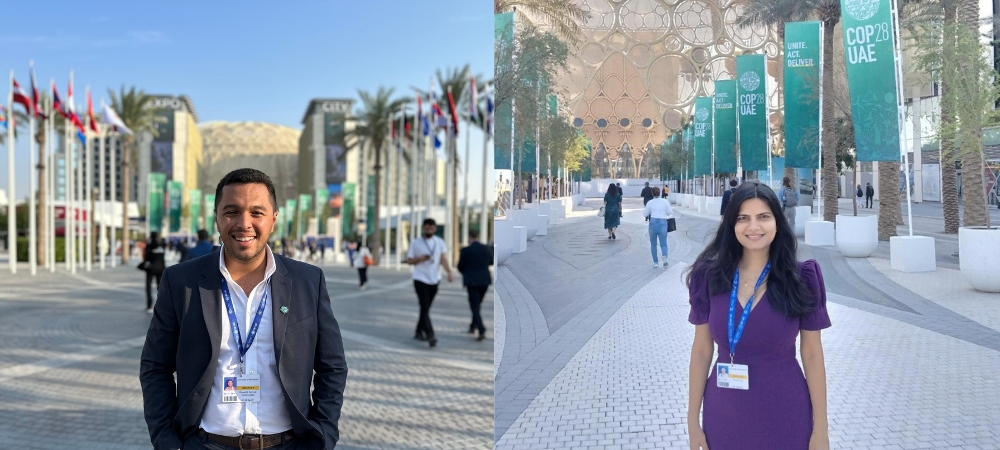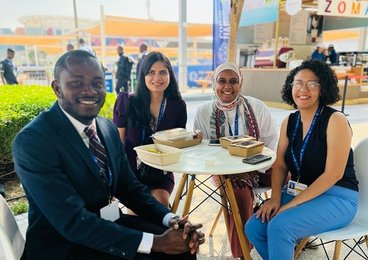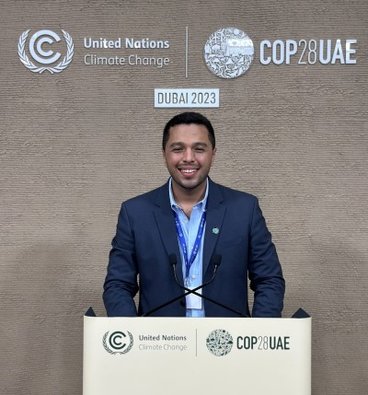
PhD students reflect on COP28 United Nations Climate Conference

Two CFANS PhD students share their experiences attending the 28th United Nations Conference of the Parties (COP28) as part of the University of Minnesota delegation comprised of students, staff, and faculty. They were among 85,000 negotiators and observers in attendance in Dubai, United Arab Emirates from November 30 to December 12, 2023. COP is the formal meeting and decision-making forum of the United Nations Framework Convention on Climate Change (UNFCCC) to assess global progress on climate change and negotiate solutions to the defining environmental and social challenge of our time.
Suman Lata is a PhD student in Bioproducts and Biosystems Engineering. Her research focuses on waste remediation for renewable energy, specifically remediation of PFAS from soil and water systems to mitigate environmental impact.

Last week, I had the privilege of attending COP28 in Dubai. I was fortunate to attend as part of the University of Minnesota’s observer delegation, joining around a dozen students from various schools at the University. The theme for this year's COP28 revolved around 'Unite. Act. Deliver.' Approximately 85,000 individuals participated in the two-week program, including Party delegates, industrialists, scientists, youth, and observers. As a first-time attendee and a grad student focusing on sustainable systems and waste remediation, I found this immersive experience fascinating and rewarding, learning from global peers leading the fight against climate change and human rights.
This marked the 28th gathering where world leaders and negotiators convened to discuss human-caused climate change. Much of the conference focused on the 'loss and damage' fund, which aims to help compensate vulnerable nations for the impact of climate change, by ensuring that vital infrastructure can be rebuilt or replaced with more sustainable versions.
This year's COP saw an enormous scale, with 198 parties joining hands to address climate change. The venue (Expo City 2020) covered an area of 1080 acres. Half of the venue hosted UN negotiations where diplomats deliberated over global agreements; the other half accommodated various pavilions, thematic arenas, side events, and exhibits. Amidst this, passionate activists marched and protested, demanding that human rights, equity, and climate justice remain central in all COP discussions.
I attended the conference during its second week, where numerous high-level talks unfolded rapidly. One of the most intriguing pavilions I visited was dedicated to Food and Agriculture. This pavilion served as a platform for collaborative dialogue, knowledge sharing, and decision-making concerning the unique role of agriculture and food systems in the fight against climate change. Several speakers highlighted the necessity of transforming food systems for the benefit of people, nature, and climate, advocating increased investment in climate-smart agriculture and innovative food system practices. They also emphasized that the agrifood system plays a pivotal role in climate action by fostering resilience, aiding in climate change adaptation, reducing GHG emissions, and simultaneously safeguarding biodiversity while ensuring food security for all.
COP28 helped me realize the interconnectedness of different perspectives such as science and technologies, indigenous knowledge, and local wisdom, emphasizing their significance in combating climate change. The motivation among attendees was palpable, and meeting inspiring individuals of all ages and genders, from children to elders, was truly uplifting. One of the most poignant moments for me was hearing an 80-year-old indigenous individual passionately speak about climate injustice. Their fervor for change for future generations was inspiring, emphasizing the role of indigenous knowledge in biodiversity conservation and the interconnectedness of social injustices with climate goals, leaving a profound impression on me.
My experience at COP28 was incredibly enlightening, exposing me to a multitude of diverse perspectives within a short period. The conference emphasized the profound impact of climate change on nations, acknowledging its disproportionate effects while highlighting the inherent challenges in achieving swift global change through collective action. Furthermore, this year's COP recognized that effective climate action should not solely concentrate on reducing emissions but also prioritize transitioning towards low-carbon economies and societies. The central focus remained on bolstering resilience by advocating the adoption of cleaner technologies. A significant historic milestone from COP28 was the agreement to triple renewable energy capacity and double energy efficiency. This pivotal move underscores the acknowledgment of the urgent need to phase out fossil fuels, which are the primary drivers of climate change.
Observing COP28 was a transformative experience that significantly influenced both my approach to PhD research and my career trajectory. My research in Bioproducts and Biosystems Engineering focuses on waste remediation for renewable energy, which is pivotal in combating climate change.
It has reshaped my vision, propelling me to navigate my PhD work and future career path with a deeper understanding of the interconnectedness and importance of addressing multifaceted challenges related to climate change.
Eduardo Garay Lagos is a PhD student in Land and Atmospheric Sciences. His research focuses on regenerative agriculture, working with cover crops as a tool to maximize crop yields while minimizing critical environmental impacts derived from nitrogenous losses.
"Grateful," "mind blown," and "committed." These are a few words that come to mind when I think about my experience at COP28. I have been to multiple professional conferences throughout graduate school, but nothing comes even remotely close to what I experienced and felt during my time there. Everything ranging from the actual magnitude of the event to the spirit and energies you perceive from people from all around the world striving to collaborate towards a common goal that unites us all, is just unimaginable. More importantly, these energies truly ground you to the earth and serve as a strong reminder of how critical it is to work together and act now if we truly want to address our current climate crisis.

Given my background in food and agriculture, I was also extremely touched and appreciated the fact that the sector received an outstanding foci and endorsement from a great majority of the parties. More than the sentiment and statement that the endorsements represent, I was also very pleased to witness and hear from minority groups such as small-holder farmers urgently demanding a seat at the table on these global conversations. I believe this is a good first step to make sure we are listening and empowering voices from the people that are most vulnerable towards the impacts of climate change.
I left convinced that actions like this are key so that relevant stakeholders at every level can do more impactful and efficient work when trying to generate sustainability and climate-resilient strategies. Even better, the wonderful opportunity that COP provides is that it also serves as an enriched multi-disciplinary stage that catalyzes synergies that would never occur elsewhere. It also reminds us that climate change has such a big impact at every level that we can imagine across communities worldwide. The multiple theme areas every day of the event provided a one-of-a-kind learning opportunity that I have never experienced in my life. To top it off, I also had the privilege of representing my country during a high-level consultation and got a snapshot of the complex process of the negotiations that parties engage in.





